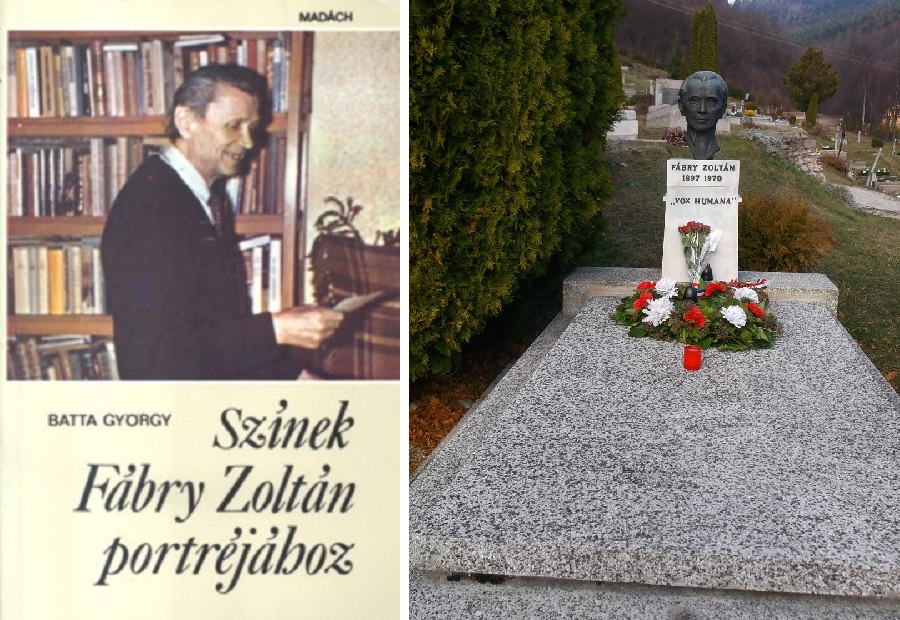One hundred and twenty-five years ago, on August 10, 1897, Zoltán Fábry, writer, publicist, critic, is one of the most significant figures of Hungarian literature and public life in the highlands.
He was born in Stósz, Abaúj county (today Slovakia) in a German-speaking smallholder family. He was brought up in an evangelical spirit and attended high school in Rozsnyó. After the outbreak of the First World War, he was conscripted in 1915, and a year later he was sent to the Galician front. The war ended on the Italian front. Faced with the murderous reality of war, he became disillusioned and became a supporter of socialism. In 1918, he enrolled in the Faculty of Humanities at the University of Pest, majoring in Hungarian history, but a year later he returned home due to the death of his father and his recurring lung disease. After the Trianon peace decree, he moved from his native village, which was transferred to Czechoslovakia, only a few times in the coming decades.
Stószon immersed himself in the world of literature, and the new Hungarian literary life in the highlands is also associated with his name.
His first work, the story A bot, was published in 1920 in the Esti Újság in Kassa. After that, thanks to his self-taught education and writing skills, he became an employee of various newspapers and magazines. His articles were initially published in Kassai Naplo, then in 1924-25 he was a contributor to Zoltán Franyó's magazine, Géniusz, and the editor of Periszkóp. From 1925, he worked for Munkás, the newspaper of the Communists, and then he came into contact with the Transylvanian magazine Korunk, of which he was the editor of the Highlands between 1926 and 1939. His extensive correspondence with Hungarian and Transylvanian literary circles enabled him to learn about Stósz and important world events. In 1931, he started the magazine Az Út, which was published until 1936.
For a decade after 1939, his writings were not published either in Nazi-friendly Slovakia, which became independent after the breakup of Czechoslovakia, or in the new Czechoslovakia after the Second World War, which accused Hungarians of collective guilt. He became the chronicler of the deprivation of rights between 1945 and 1948. His 1946 pamphlet against Hungarian persecution and collective guilt entitled A vádlott megszólal was circulated in manuscript, but was only published in 1968, during the Prague Spring, in Stószi's volume Mornings.
Fábry was more interested in ethics than aesthetics. He knew about everything and reacted to everything, he corresponded with Thomas Mann and Romain Rolland. His 1966 book, The Kidnapping of Europe, depicts not only fascism, but also other autocratic regimes – it is his most enduring work.
In 1967, on the occasion of his seventieth birthday, he received the Madách prize, which was awarded for the first time, his selected writings were published under the title Hazánk, Európa, and the Irodalmi Szemle greeted him with a thematic issue of Kortárs. His health gradually deteriorated, and on May 31, 1970, Stószon died of a heart attack.
In his will, he designated the Csemadok and, through the Csemadok, the Hungarians from the highlands as his heirs.
As they wrote about him in a commemoration: "He was not a witness to a controversial era without contradictions, but his whole life was guided by the value system of humanity. From this position, he fought as a writer-publicist against the brutality of fascism, the inhumanity of deprivation of rights and the anti-culture of Stalinism."
The Zoltán Fábry Literary and Cultural Days began the year after his death with Kassa, Szepsi, Stósz, Buzita and other locations. This year, the program will be held on August 13 and August 14. Katalin Szili, Acting Prime Minister of Hungary, gives a lecture, former President of the Republic Rudolf Schuster delivers a memorial speech.
Source and full article: velvidek.ma
Featured Image: Wikipedia













